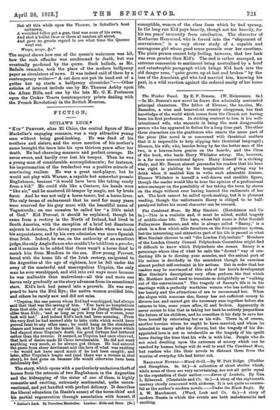F IC TIO N.
OUTLAW'S LUCK.*
" KID " PREVOST, alias El Chico, the central figure of Miss
Mackellar's engaging romance, was a very attractive yormg man without being good-looking. He was fond of his brothers and sisters, and the mere mention of his mother's name brought the tears into his eyes thirteen years after her death. He had charming manners and perfect courage. He never swore, and hardly ever lost his temper. Then he was a young man of considerable accomplishments ; for instance, his impersonation of the tenderfoot was a positive miracle of
convincing realism. He was a great card-player, but he would not play with Warner, a capable but somewhat prosaic Englishman, because "it would have been like taking candy
from a kid." He could ride like a Centaur, his bands were "like air," and he mastered ill-temper by magic, not by brute force. And he was not only a horse-tamer, but a horse-lover. The only terms of endearment that he used for many years were reserved for his grey mare with the beautiful name of Vagamunda ; on one occasion he called her "a little saint of God." Kid Prevost, it should be explained, though he came from a rectory in the North of Ireland, had lived in South America, with the exception of a brief but disastrous sojourn in Arizona, for eleven years at the date when we make his acquaintance, and by his own admission was more Spanish than Irish. Indeed, he was, on the authority of an excellent
judge, the only Anglo-Saxon who couldn't be told from a gaucho; and it remains to be added that there wasn't a horse thief to match him from Mendoza to the sea. How young Prevost, bored with the home life of the Irish rectory, emigrated to
the Argentine at the age of eighteen, how he fell under the sway of the masterful and unscrupulous Urquiza, the only man he ever worshipped, and slid into evil ways more because he was malleable than malevolent—all this and more one learns only gradually as the story advances from its sensational start. Kid's luck had passed into a proverb. He was sup-
posed to have the Evil Eye; the native women avoided him, and others he rarely saw and did not miss.
"Urquiza, the one person whom Kid had worshipped, had always said that that was the saving of him. • You have no temptations from that side, oh son of my old age,' said he (being fifteen years older than Kid) ; `and as long as you keep free of women, your luck will last.' And indeed Kid's luck had been amazing. From the very first he had seemed able to take risks which would have proved fatal to any other man ; he could hang on the slenderest chance and brazen out the lamest lie, and in the five years which had elapsed since Urquiza's death his good fortune had bettered rather than the reverse. It seemed, as Urquiza had once observed, that lack of desire made El Chico invulnerable. He did not want anything very much, so he always got things. He had entered the game from sheer devilment and the love of what was exciting —he would not have cared much if he had been caught ; and later, after Urquiza's tragic end (and there was a woman in that story), he had gone on because life would otherwise have been intolerably fiat."
The story, which opens with a particularly audacious theft of
horses from the estancia of two Englishmen in the Argentine and the kidnapping of the sister of one of them, is highly romantic and exciting, extremely sentimental, quite uncon-
ventional, and yet handled with perfect delicacy. It describes the liberal education (in Steele's sense) of the horse-thief and his partial regeneration through association with honest, if
• ChitiGW'S Ludt.. By Dorothea Ilackellar. London : Kills and Boon. [Os.]
susceptible, women of the class from which he had sprung. In the long run Kid pays heavily, though not too heavily, for his ten years' immunity from retribution. The character of Katharine Hammond, who is forced into the "elopement of convenience," is a very clever study of a capable and courageous girl whose good sense prevails over her emotions. The plain person cannot help feeling, however, that her luck was even greater than Kid's. The end is rather scamped, an extreme concession to sentiment being neutralized by a brief and catastrophic paragraph which brings Kid back into the old danger zone, "quite grown up at last and broken" by the loss of the American girl who had married him, knowing his past, in a wild reaction against the ordered sanity of her home life.


























































 Previous page
Previous page